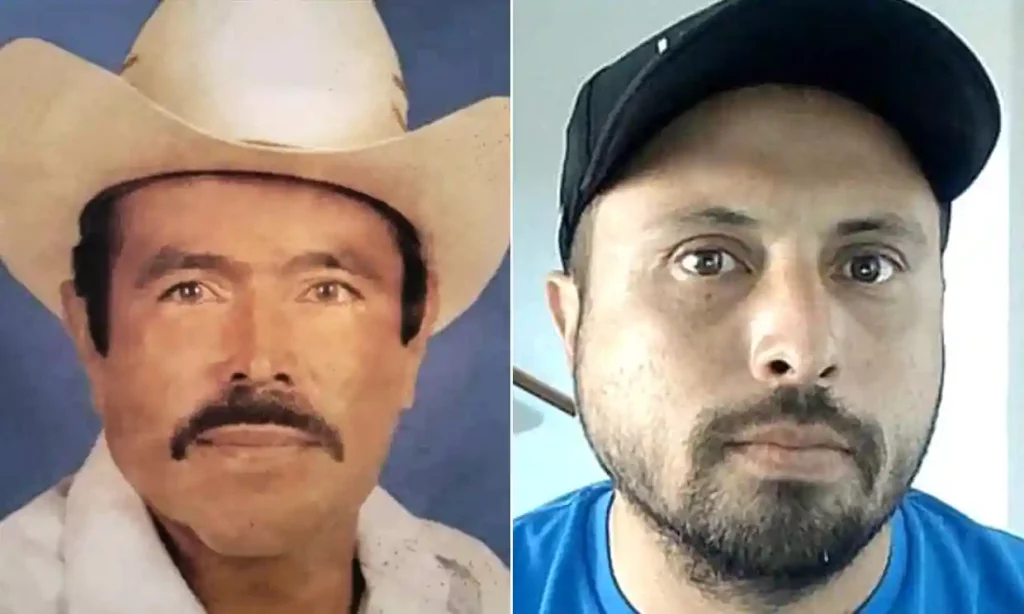from The Guardian

Antonio Díaz Valencia and Ricardo Lagunes. The mining company Ternium Mexico has denied any involvement in their disappearance
Relatives of two missing Mexican environmentalists are pointing the finger at a transnational mining company which they claim is responsible for environmental destruction and violence in the rural community, and may have links to the criminals who abducted their loved ones.
Ricardo Arturo Lagunes Gasca, a renowned human rights lawyer, and Antonio Díaz Valencia, leader of the Aquila Indigenous community in the state of Michoacán, were last seen on Sunday evening after attending an anti-mining community meeting.
According to witnesses, the two activists were threatened and followed by several men in cars and motorbikes after they left the meeting in Aquila and headed towards the neighbouring state of Colima. Lagunes, 41, and Díaz, 71, were travelling in a white Honda pickup truck that was later found abandoned on the side of a highway riddled with bullets but no blood.
“The hitmen were waiting for the right moment. They had threatened the teacher [Díaz] and the lawyer [Lagunes] in the past, and told us that there were five of us on their list. The hitmen were there watching on Sunday, they followed them on motorcycles and in cars and took them away,” said Miguel Jiménez a community member, whose name has been changed to protect him from reprisals.
At a press conference on Thursday, the sister of the missing lawyer, said: “We want to emphasise the possible responsibility of the mining company Ternium in ensuring that my brother Ricardo Lagunes and Professor Antonio Díaz reappear alive.
“The company is one of the most powerful actors in the region, and its operations have not only affected the environment but also the social fabric, generating conflicts and violence. The company has relations with different local groups and possibly with the perpetrators of this disappearance. We call for a full investigation, and for the company to support us to find my brother and Antonio alive,” said Lucía Lagunes Gasca.
“We believe that the company could be involved, and that’s why we are asking for the company to come clean; if they don’t have anything to hide they should say so,” said María de Jesús Lagunes, the missing lawyer’s aunt.
Lagunes, a renowned Indigenous and land rights defender, is representing the Aquila community in its fight for compensation from the company, whose mines are alleged to have generated a environmental, health and social harms, as well as community divisions and violence.
Last week, three community members – who were part of a self-defence force trying to protect their territory from criminal groups and land grabs – were murdered by members of the Jalisco New Generation Cartel (CJNG), one of Mexico’s most powerful and violent criminal groups. Two others managed to escape.
Violence along the Colima-Michoacán border in northern Mexico has triggered mass displacements and forced immigration as the CJNG has waged war against the Knights Templar cartel in order to gain control of various illicit and legal industries including mining, avocados and bananas.
Mexico is one of the most dangerous countries in the world for environmental and land rights defenders, where criminal groups and corrupt officials threaten and attack communities with almost total impunity. In 2021, 54 land rights defenders were murdered and 19 others disappeared, according to Global Witness, the international watchdog that tracks violences linked to extractive projects.
In recent years, the CJNG has made a foray into illegal mining, perpetrating “violence against Indigenous communities with complete impunity and without an adequate response from the Mexican state”, said Global Witness.
Lagunes had previously been awarded protective measures on numerous occasions by the Mexican government and Inter-American Commission on Human Rights in response to death threats linked to high-profile land rights cases.
Amid growing fear about the men’s safety – and anger about the states’ lacklustre response – relatives, colleagues and other supporters in Mexico City have set up a protest camp in front of the national palace demanding that authorities act.
The situation is complex, and the community is divided. On one hand, the anti-mining community groups are demanding that Ternium Mexico, fulfils the financial, social and infrastructure promises made in 2012. They are also trying to stop a new mining project for iron ore and other metals, which they claim has not been authorised.
On the other hand, other community members are allegedly aligned with the company and/or criminal gangs, according to local reports.
In the past decade, 38 local environmental and land rights defenders have been killed, another six have disappeared, according to the National Network of Civil Human Rights Organizations “All Rights for Everybody”. None of the crimes have been successfully prosecuted.
Despite the conflicts and violence, anti-mining community activists have vowed to continue their struggle amid a surge in childhood diseases, water shortages, land erosion and deforestation. Jiménez said: “We are scared in this struggle, with fear that at any time another of us could be next. We need the government to get our colleagues back, otherwise the community groups will have to act.”
Ternium Mexico is the local subsidiary of the Luxembourg-based steel group Ternium, which is part of the Italian-Argentinian group Techinta.
